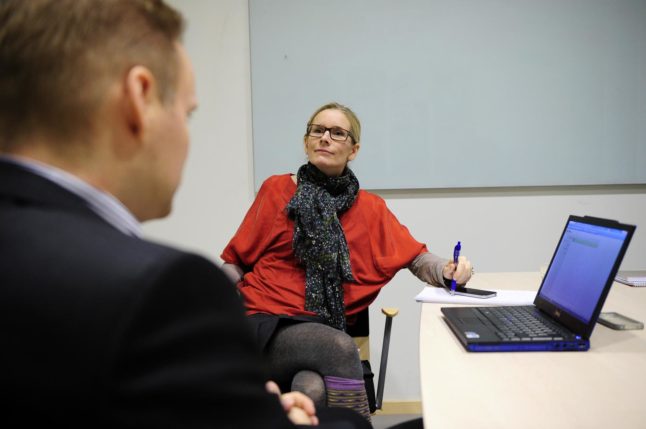One international worker who found it hard to land her first job in Sweden is Amanda Herzog, who eventually founded Intertalents in Sweden with the aim of helping other immigrants find work in the country.
Herzog originally came to Sweden to study at Jönköping University and decided to stay after graduating.
“I thought it would take three months, maybe six months to find a job, I was prepared for that,” she told The Local during a live recording of our Sweden in Focus podcast held as part of Talent Talks, an afternoon of discussions at the Stockholm Business Region offices on how to attract and retain foreign workers in Sweden.
“What happened was it took over 13 months and 800 applications to actually get a job in my industry, within marketing.”
During this time, Herzog was getting multiple interviews a month, but was not getting any further in the process, despite showing her CV to Swedish recruiters for feedback.
“They were baffled as well,” she said. “By the time I landed my dream job, I had to go outside of the typical advice and experiment, and figure out how I actually can get hired. By the time I got hired, I realised what actually works isn’t really being taught.”
‘Reassess your cultural background’
Often, those who come to Herzog for help have sent out hundreds of CVs and are unsure what their next steps should be.
“My first piece of advice is to stop for a second,” she said. “Reassess your cultural background and how it fits into Sweden.”
Herzog, for example, discovered she was interviewing in “the American way”.
In the US, when asked to tell an interviewer about yourself, you’d be expected to discuss your career history – how many people have you managed? Did sales improve while you were working there? – while Swedes are more likely to want to know about you as a person and why you want to work in a specific role for their company in particular.
“A lot of people don’t know this, so imagine all of the other cultural things that they’re doing differently that they learned in their country is normal,” Herzog adds.
“Just start with learning, because it could be that you don’t need to change very much, you are qualified, you just need to connect with the Swedish way of doing things.”
Networking is important
“Don’t hesitate to reach out for help and guidance,” said Laureline Vallée, an environmental engineer from France who recently found a job in Sweden after moving here nine months ago with her partner, who got a job as a postdoc at KTH Royal Institute of Technology.
“You tend to insulate yourself and consider yourself not capable, but you’re not less capable than you were in your home country, you just need to explain it to the employers.”
Another tip is to network as much as you can, Vallée said.
“Networking is really important here in Sweden, so just go for it, connect with people in the same field.”
This could be through networks like Stockholm Akademiska Forum’s Dual Career Network, which helps the accompanying partners or spouses of foreign workers find a job in Sweden, or through other connections, like neighbours, friends, or people you meet through hobbies, for example.
Make a clear profile for yourself
Another common issue is that applicants are not presenting themselves clearly to recruiters, Stockholm Akademiska Forum’s CEO, Maria Fogelström Kylberg, told The Local.
“If you’re sending 600 applications without an answer, something is wrong. We have seen many people looking for jobs working in a supermarket, and the next application is a managing director post,” she said. “You have to decide ‘who am I? What do I want to do?’, you have to profile yourself in a clear way.”
This could be editing down your CV so you’re not rejected for being overqualified, or just thinking more closely about how you present yourself to a prospective employer.
“Which of my skills are transferable? How can I be of use to this company? Not what they can do for me, but what problem can I solve with my competence?”
Job hunters should also not be afraid of applying for a job which lists Swedish as a requirement in the job description, Fogelström Kylberg said.
“Sometimes if I see an ad for a job and I have a perfect candidate in front of me, I call the company and say ‘I have a perfect candidate, but you need them to speak Swedish’, they then say ‘no, that’s not so important’. This is not so unusual at all so don’t be afraid of calling them to say ‘do I really need perfect Swedish?’”
Listen to the full interview with Maria Fogelström Kylberg, Amanda Herzog and Laureline Vallée in The Local’s Sweden in Focus Extra podcast for Membership+ subscribers.
Interview by Paul O’Mahony, article by Becky Waterton



 Please whitelist us to continue reading.
Please whitelist us to continue reading.
Some of these apply in the US as well. Always always tailor your CV to the job. Focus on what you can deliver and have delivered, not mundane job tasks. What skills are most important? What can you tell the employer about yourself as a person that translates to being part of a company and team?
“We have seen many people looking for jobs working in a supermarket, and the next application is a managing director post”. This happens not because people can’t decide if they want to be a till assistant or managing director, but because they are hard pressed to find any job at all. One has to come from a rather privileged position to be unaware of that. The conclusion is all the same, this type of “downgrading” doesn’t work because then you’re labeled “overqualified”.
Europeans and Swedes tend to embellish their experience (on their resumes) much more Americans and Canadians.
Amercians and Canadians shortern bullets – remove the garnish. European resumes are often long, and tend to oversell.
In the US, its often common cut your resume down to just one page, size 11 font.
Longer than this – it needs work.
Cut all bullet points down to one line.